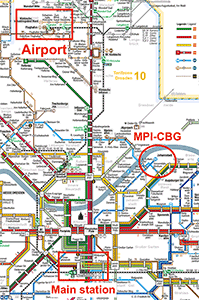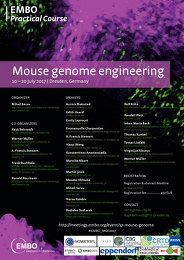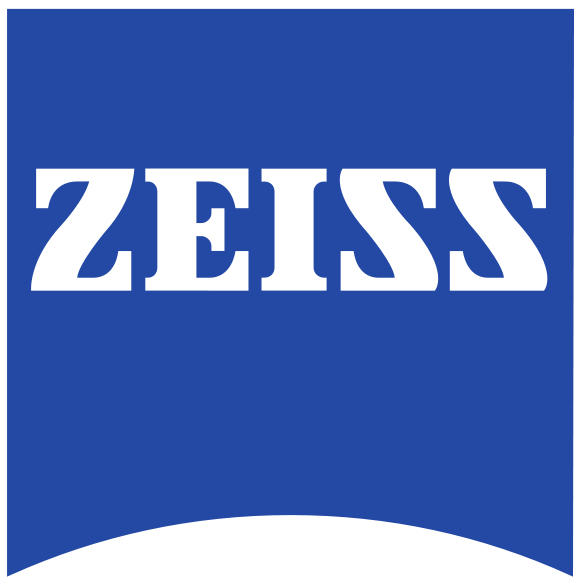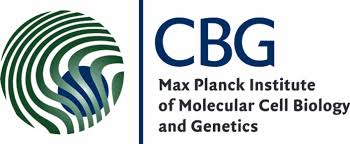Max Planck Institute of Molecular Cell Biology and Genetics in Dresden
Pfotenhauerstr. 108
D-01307 Dresden
Germany
The Max Planck Institute of Molecular Cell Biology and Genetics (MPI-CBG), founded in 1998, is one of 80 institutes of the Max Planck Society, an independent non-profit organization in Germany is part of the Dresden Campus. The Dresden Campus has a strong background in genome engineering. Recombineering, the basis of efficient genome engineering in mouse ES cells was developed in the lab of Francis Stewart (co-organizer). In addition we have three facilities that routinely generate mouse mutants and work closely together, namely the Genome Engineering Facility at MPI CBG, the Transgenic core facility MPI CBG and Carus Genomics Facility at Faculty of Medicine, each headed by one of the organizers.
The participants will be accommodated in the Hotel am Blauen Wunder
See: http://www.habw.de
The hotel is within walking distance of the MPI-CBG.
For directions, see here.
Two participants will share one room.
One can also use public transport to get closer to the Institute starting from Prellerstraße → Dresden Augsburger Straße, TRAM num. 6, 12.

VIA PLANE
Dresden has a relatively small airport connected by Lufthansa to major German hubs such as Frankfurt, Munich and Duesseldorf. There is also an AirFrance flight from London City. http://www.dresden-airport.de/
Berlin Schoenefeld International airport is about 172 km from Dresden, easily reachable by regular trains. See here for details.
Vaclav Havel Airport Prague in the Czech Republic is another option, 160 km away, also connected by trains about every two hours. http://www.prg.aero/en/
From the Dresden Airport, please take the train S2 (every 30 min) to the train station Bahnhof-Neustadt. Then take the tram no. 6, direction Niedersedlitz, to the station Königsheimplatz. Cross the street and walk along the street Schubertstrasse till you come to Pfotenhauerstrasse and turn left. Our institute is at Pfotenhauerstrasse 108. The building is green and blue. [approx. 40 mins.]
VIA TRAIN
Dresden is easily reachable by train. There are two train stations in Dresden: Hauptbahnhof and Bahnhof Neustadt
From the main train station [Hauptbahnhof] please take the tram no. 10, direction Striesen, to the station Fetscherplatz. Then take the tram no. 12, direction Striesen, to the station Königsheimplatz. Cross the street and walk along the street Schubertstrasse till you come to Pfotenhauerstrasse and turn left. Our institute is at Pfotenhauerstrasse 108. The building is green and blue. [approx. 20 mins.]
You can also use tram no. 3 (Wilder Mann) or 7 (Weixdorf) and change at Pirnaischer Platz to bus line 62 (Johannstadt). The terminal stop is right opposite ofthe Institute. [approx. 23 mins.]
From the train station Bahnhof Neustadt take tram no. 6, direction Niedersedlitz, to the station Königsheimplatz. Cross the street and walk along the street Schubertstrasse till you come to Pfotenhauerstrasse and turn left. Our institute is at Pfotenhauerstrasse 108. The building is green and blue. [approx. 15 mins.]
Reaching the Institute via tram or bus
Take tram no. 6 or no. 12 to the station Königsheimplatz. Walk along the street Schubertstrasse till you come to Pfotenhauerstrasse and turn left.
Alternatively, take bus no. 62 or no. 74 to Johannstadt. Our institute is at Pfotenhauerstrasse 108. The building is green and blue.
To check the schedule of public transport use this web site.
VIA CAR
from Berlin (north)
Leave Autobahn A4 at the exit Dresden-Hellerau, which will take you onto the B 170 heading towards the city center (Zentrum). Stay on the B 170 for about 5 km until it reaches the intersection "Carolaplatz". At the next intersection turn right onto the "Albertbrücke" bridge. From now on follow the signs "Uniklinikum" to the medical clinic. Once over the bridge, you have to drive a circle in order to turn to the left, which means taking the second street to the right, then turn to the right and to the right again onto "Käthe-Kollwitz-Ufer". Follow "Käthe-Kollwitz-Ufer" and turn right into "Fetscherstrasse". At the first intersection turn left into "Pfotenhauerstrasse". Our institute is on the right at Pfotenhauerstrasse 108. The building is green and blue.
from Munich/Frankfurt/Leipzig (south)
Leave Autobahn A4 at the exit Dresden-Altstadt, which will take you onto the B 6. Follow the signs to the city center (Zentrum) and stay on the B 6 for about 4 km until an intersection with a Turkish Mosque on the left side. Still following the signs to the city center (Zentrum), turn left and pass the Mosque. Follow the road which turns to the right and goes under the railway bridge. This leads you to "Uferstrasse" which takes two sharp bends (passing Semperoper opera house). Now you are on the "Terrassenufer" which takes you parallel to the river Elbe. Stay on this road following the sign "Uniklinikum". The street merges to "Käthe-Kollwitz-Ufer". Follow "Käthe-Kollwitz-Ufer" and turn right into "Fetscherstrasse". At the first intersection turn left into "Pfotenhauerstrasse". Our institute is on the right at Pfotenhauerstrasse 108. The building is green and blue.
from Prague
Follow the highway D8 going north from the Prague circle towards Aussig (Usti nad Labem) or Teplitz (Teplice) and Dresden. The highway is interrupted in the middle by the scenic Ceske Stredohori mountain for about 20 km (narrow road, follow signs for Dresden). The trip takes about 2 hours.
Dresden is considered one of the most beautiful cities of Germany. It is located in the east of Germany in the valley of the river Elbe. Dresden is about 2.5 hrs away from Berlin as well as Prague. Being the capital of Saxony it has been a center of political and cultural life for centuries, and its skyline with the Zwinger, the Green Vault, the Painting Gallery, the castle, the Semper Opera, the Court Chapel, Taschenberg Palace, and the recently rebuilt Frauenkirche are world-famous. But the city is not only famous for its baroque architecture and beautiful surrounding landscapes. Dresden has evolved into a vivid and international scientific and industrial center and is one of the most outstanding locations for research and science in Germany with emphasis on biotechnology, nano- and microelectronics. In appreciation of this dynamic development, Dresden has been awarded the “City of Science” in 2006. (source).













